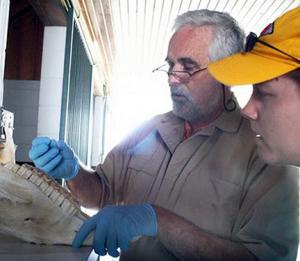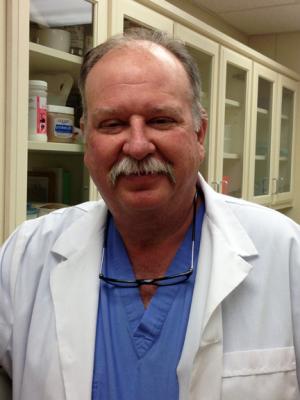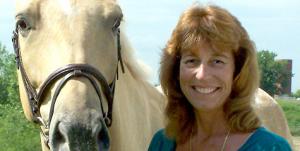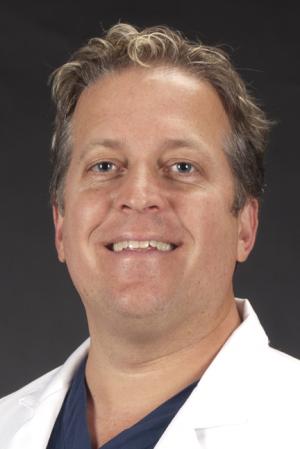On February 24-26, 2017 the Tennessee Veterinary Medical Association hosted the seventh annual Music City Veterinary Conference, this year held in Murfreesboro, TN. It is a continuing education conference planned by practitioners for practitioners, with more than 100 hours of continuing education credits offered through cutting-edge lectures from some of the top veterinary practitioners. USDA Accreditation Modules were also offered, with instructors Nicki Humphrey, DVM, on animal disease traceability; Todd Duenckel, DVM, MPH on foreign animal disease detection; Shawn Bolton, DVM on avian influenza, exotic Newcastle disease, and animal health emergency response; and Harley Sutton, DVM, FADD on personal protective equipment for veterinarians.
Each day offered a wide variety of sessions on Small Animal practice, Large Animal practice, Practice Management, USDA Accreditation Certification modules, and Veterinary Technician.
Oakland, Tennessee veterinarian Dr. Stephen Galloway presented several sessions on Oral Surgery that were prerequisites for the Wet-Lab, a 2-hour interactive lab in which veterinarians apply principles learned in the Oral Surgery lectures to surgically extract canine and carnassial teeth in dogs.
Large Animal speakers included Chris Chase, DVM, Professor, Dept. of Veterinary and Biomedical Sciences at South Dakota State University. His research has been directed at understanding the initial events of viral infections to develop better methods for preventing virus infections in animals. Dr. Chase’s presentations focused on immunology.
Jack Easley, DVM, MS, DABVP(Eq), DAVDC(Eq) of Easly Equine Dentistry in Shelbyville, Kentucky also lectured in equine dentistry. For over 40 years, Dr. Easley has lectured on, and promoted, equine veterinary dentistry throughout the world. He has written hundreds of articles for publication in professional as well as lay equine journals, textbooks and periodicals.
Patrick Gorden, DVM, is Senior Clinician at Iowa State University’s College of Veterinary Medicine, where he splits his time among providing clinical service to dairy clients, teaching dairy production medicine to veterinary students, collaborative research, and departmental administration.
Joe Hillhouse, DVM, is from Carson County Veterinary Clinic in Panhandle, Texas, where he and his wife both practice. Dr. Hillhouse’s primary professional interest is business management of the rural veterinary practice.
Jeff Phillips, DVM of Innovetive Petcare in Knoxville, Tenn., found his passion for helping animals within the field of oncology. He earned both a DVM and a PhD (medical genetics) from Tufts University. In 2016, he was promoted to the position of Director of Specialty Medicine for the Innovetive group. Dr. Phillips has continued to build his program in research and the clinical equine oncology in collaboration with investigators at both Lincoln Memorial University and the University of Tennessee. His presentations were on Equine Melanoma, Equine Squamous Cell Carcinoma and Sarcoids, and Treatment Options for Solid Tumors in Horses.
Katie Young, PhD, of Purina Animal Nutrition in St. Louis, Missouri, works directly with horse owners and trainers, and shared her knowledge of equine nutrition and digestive physiology. Dr. Young’s research expertise and interests include: mineral nutrition in horses; exercise physiology, including electrolyte requirements of working horses; and addressing nutritional needs of draft horses. Dr. Young holds a doctorate in equine nutrition and exercise physiology from Texas A&M University.
Two faculty members from the University of Tennessee at Martin spoke in the Vet. Tech program offerings: Danny Walker, DVM and Jason Roberts, DVM. Dr. Roberts is Associate Professor of Animal Science and Director of the West Tennessee Animal Diseases Diagnostics Lab. Dr. Walker is Associate Professor in the Veterinary Technology program.
Dr. Walker told the Mid-South Horse Review:
“The vet tech profession is on the rise, with all of our [UT Martin] graduates being employed, and the opportunities never cease to amaze us, as veterinarians call every week looking for help. The vet techs, or nurses which some are now being called, are vital to the veterinary team. They are versatile in doing exams, radiology, pharmacology, surgery assisting, and client communication. The most fulfilling part of this profession is making a difference in a pet's life and adding quality of care. The U.S. Bureau of Labor Statistics says the job outlook is 19% faster than in other health related occupations.
“In saying this, our task is to keep them [vet techs] from becoming burned out at what they do. Our discussion will identify if there is a problem, how to manage the problem, and ways to improve relationships. The most important aspect to prevent burnout is to balance your time between rest and work. You must stick to a schedule and learn how to say no; also learn to delegate, which will help you relieve some stress.
“The UTM Veterinary Technology degree is a four-year program resulting in a B.S. degree upon completion. There are only 25 four-year veterinary technology schools in the U.S. and we feel we have one of the best at UTM.
“I graduated at UTM in 1975 and later attended Auburn University to receive my D.V.M. I owned and practiced in Jackson, Tennessee for 32 years, in a mixed animal practice for 15 years and a small animal practice for 17 years. I have been Associate Professor in the Veterinary Technology program at UTM for five years.”
Dr. Jason Roberts wrote to the Mid-South Horse Review:
“UTM offers a pre-veterinary medicine program, in which students earn a Bachelor’s degree in animal science and meet the requirements to apply for veterinary school, a bachelor’s degree in veterinary technology, and an online bachelor’s completion program for students who have earned an associate’s degree in veterinary technology and would like to complete their Bachelor’s degree in veterinary technology.
“There are many good opportunities for veterinary science students at UT Martin in the classroom and on the teaching farm. There is a large 700 acre teaching farm on campus with horses, beef cattle, sheep, goats, swine, and a companion animal (dog and cat) laboratory. The primary purposes of the farm are teaching, undergraduate research, and demonstration. Students have numerous opportunities to work with the animals in classes and laboratories throughout their undergraduate education. We also have an animal disease and diagnostic laboratory, which performs necropsies and diagnostics for producers of West Tennessee. There are many opportunities for students to get involved with the Diagnostic Laboratory.
“I will be presenting on Large Animal Topics in Parasitology at the Music City Veterinary Conference. I begin with a brief review of common large animal parasites and farm management strategies. This information will then be used to help the veterinary technicians focus on providing valuable client education and diagnostic testing procedures for large animal owners and producers, while at the same time adding value to the veterinary practice by providing diagnostic testing and product recommendation associated with these parasites. The emphasis of the talk will be for the veterinary technician to use their skills and education to help clients make informed decisions and develop proper management strategies.”
Find more information about the Veterinary Health Technology program at UT Martin at: https://www.utm.edu/departments/agnr/VetTech/index.php
The Tennessee Veterinary Medical Association (TVMA) is headquartered in Fayetteville, Tenn. Find more information about TVMA, legislative updates, veterinary career listings, and the conference at:
http://tvmanet.com
Read the conference brochure here: http://tvmanet.com/wp-content/uploads/sites/4/2016/11/2017-MCVC-Registration-Brochure-FINAL.pdf
Each day offered a wide variety of sessions on Small Animal practice, Large Animal practice, Practice Management, USDA Accreditation Certification modules, and Veterinary Technician.
Oakland, Tennessee veterinarian Dr. Stephen Galloway presented several sessions on Oral Surgery that were prerequisites for the Wet-Lab, a 2-hour interactive lab in which veterinarians apply principles learned in the Oral Surgery lectures to surgically extract canine and carnassial teeth in dogs.
Large Animal speakers included Chris Chase, DVM, Professor, Dept. of Veterinary and Biomedical Sciences at South Dakota State University. His research has been directed at understanding the initial events of viral infections to develop better methods for preventing virus infections in animals. Dr. Chase’s presentations focused on immunology.
Jack Easley, DVM, MS, DABVP(Eq), DAVDC(Eq) of Easly Equine Dentistry in Shelbyville, Kentucky also lectured in equine dentistry. For over 40 years, Dr. Easley has lectured on, and promoted, equine veterinary dentistry throughout the world. He has written hundreds of articles for publication in professional as well as lay equine journals, textbooks and periodicals.
Patrick Gorden, DVM, is Senior Clinician at Iowa State University’s College of Veterinary Medicine, where he splits his time among providing clinical service to dairy clients, teaching dairy production medicine to veterinary students, collaborative research, and departmental administration.
Joe Hillhouse, DVM, is from Carson County Veterinary Clinic in Panhandle, Texas, where he and his wife both practice. Dr. Hillhouse’s primary professional interest is business management of the rural veterinary practice.
Jeff Phillips, DVM of Innovetive Petcare in Knoxville, Tenn., found his passion for helping animals within the field of oncology. He earned both a DVM and a PhD (medical genetics) from Tufts University. In 2016, he was promoted to the position of Director of Specialty Medicine for the Innovetive group. Dr. Phillips has continued to build his program in research and the clinical equine oncology in collaboration with investigators at both Lincoln Memorial University and the University of Tennessee. His presentations were on Equine Melanoma, Equine Squamous Cell Carcinoma and Sarcoids, and Treatment Options for Solid Tumors in Horses.
Katie Young, PhD, of Purina Animal Nutrition in St. Louis, Missouri, works directly with horse owners and trainers, and shared her knowledge of equine nutrition and digestive physiology. Dr. Young’s research expertise and interests include: mineral nutrition in horses; exercise physiology, including electrolyte requirements of working horses; and addressing nutritional needs of draft horses. Dr. Young holds a doctorate in equine nutrition and exercise physiology from Texas A&M University.
Two faculty members from the University of Tennessee at Martin spoke in the Vet. Tech program offerings: Danny Walker, DVM and Jason Roberts, DVM. Dr. Roberts is Associate Professor of Animal Science and Director of the West Tennessee Animal Diseases Diagnostics Lab. Dr. Walker is Associate Professor in the Veterinary Technology program.
Dr. Walker told the Mid-South Horse Review:
“The vet tech profession is on the rise, with all of our [UT Martin] graduates being employed, and the opportunities never cease to amaze us, as veterinarians call every week looking for help. The vet techs, or nurses which some are now being called, are vital to the veterinary team. They are versatile in doing exams, radiology, pharmacology, surgery assisting, and client communication. The most fulfilling part of this profession is making a difference in a pet's life and adding quality of care. The U.S. Bureau of Labor Statistics says the job outlook is 19% faster than in other health related occupations.
“In saying this, our task is to keep them [vet techs] from becoming burned out at what they do. Our discussion will identify if there is a problem, how to manage the problem, and ways to improve relationships. The most important aspect to prevent burnout is to balance your time between rest and work. You must stick to a schedule and learn how to say no; also learn to delegate, which will help you relieve some stress.
“The UTM Veterinary Technology degree is a four-year program resulting in a B.S. degree upon completion. There are only 25 four-year veterinary technology schools in the U.S. and we feel we have one of the best at UTM.
“I graduated at UTM in 1975 and later attended Auburn University to receive my D.V.M. I owned and practiced in Jackson, Tennessee for 32 years, in a mixed animal practice for 15 years and a small animal practice for 17 years. I have been Associate Professor in the Veterinary Technology program at UTM for five years.”
Dr. Jason Roberts wrote to the Mid-South Horse Review:
“UTM offers a pre-veterinary medicine program, in which students earn a Bachelor’s degree in animal science and meet the requirements to apply for veterinary school, a bachelor’s degree in veterinary technology, and an online bachelor’s completion program for students who have earned an associate’s degree in veterinary technology and would like to complete their Bachelor’s degree in veterinary technology.
“There are many good opportunities for veterinary science students at UT Martin in the classroom and on the teaching farm. There is a large 700 acre teaching farm on campus with horses, beef cattle, sheep, goats, swine, and a companion animal (dog and cat) laboratory. The primary purposes of the farm are teaching, undergraduate research, and demonstration. Students have numerous opportunities to work with the animals in classes and laboratories throughout their undergraduate education. We also have an animal disease and diagnostic laboratory, which performs necropsies and diagnostics for producers of West Tennessee. There are many opportunities for students to get involved with the Diagnostic Laboratory.
“I will be presenting on Large Animal Topics in Parasitology at the Music City Veterinary Conference. I begin with a brief review of common large animal parasites and farm management strategies. This information will then be used to help the veterinary technicians focus on providing valuable client education and diagnostic testing procedures for large animal owners and producers, while at the same time adding value to the veterinary practice by providing diagnostic testing and product recommendation associated with these parasites. The emphasis of the talk will be for the veterinary technician to use their skills and education to help clients make informed decisions and develop proper management strategies.”
Find more information about the Veterinary Health Technology program at UT Martin at: https://www.utm.edu/departments/agnr/VetTech/index.php
The Tennessee Veterinary Medical Association (TVMA) is headquartered in Fayetteville, Tenn. Find more information about TVMA, legislative updates, veterinary career listings, and the conference at:
http://tvmanet.com
Read the conference brochure here: http://tvmanet.com/wp-content/uploads/sites/4/2016/11/2017-MCVC-Registration-Brochure-FINAL.pdf












